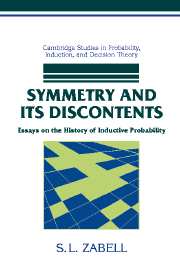4 - W. E. Johnson's “Sufficientness” Postulate
Published online by Cambridge University Press: 05 June 2012
Summary
How do Bayesians justify using conjugate priors on grounds other than mathematical convenience? In the 1920s the Cambridge philosopher William Ernest Johnson in effect characterized symmetric Dirichlet priors for multinomial sampling in terms of a natural and easily assessed subjective condition. Johnson's proof can be generalized to include asymmetric Dirichlet priors and those finitely exchangeable sequences with linear posterior expectation of success. Some interesting open problems that Johnson's result raises, and its historical and philosophical background, are also discussed.
Key words and phrases: W. E. Johnson, sufficientness postulate, exchangeability, Dirichlet prior, Rudolph Carnap.
INTRODUCTION
In 1932 a posthumously published article by the Cambridge philosopher W. E. Johnson showed how symmetric Dirichlet priors for infinitely exchangeable multinomial sequences could be characterized by a simple property termed “Johnson's sufficiency postulate” by I. J. Good (1965). (Good (1967) later shifted to the term “sufficientness” to avoid confusion with the usual statistical meaning of sufficiency.) Johnson could prove such a result, prior to the appearance of de Finetti's work on exchangeability and the representation theorem, for Johnson had himself already invented the concept of exchangeability, dubbed by him the “permutation postulate” (see Johnson, 1924, page 183). Johnson's contributions were largely overlooked by philosophers and statisticians alike until the publication of Good's 1965 monograph, which discussed and made serious use of Johnson's result.
Due perhaps in part to the posthumous nature of its publication, Johnson's proof was only sketched and contains several gaps and ambiguities; the major purpose of this paper is to present a complete version of Johnson's proof.
- Type
- Chapter
- Information
- Symmetry and its DiscontentsEssays on the History of Inductive Probability, pp. 84 - 96Publisher: Cambridge University PressPrint publication year: 2005



